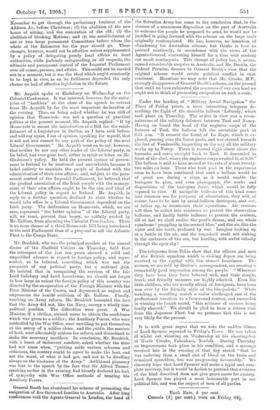Mr. Brodrick, who was the principal speaker at the annual
dinner of the Sheffield Cutlers on Thursday, held that the retrospect of the last ten years showed a solid and unqualified advance in regard to foreign policy, and repre- sented, as he believed, something which was not the perquisite of any political party, but a national gain. He insisted that in recognising the services of the late Lord Salisbury and Lord Lansdowne, we should not forget to how large an extent the foreign policy of this country was directed by the co-operation of the Foreign Minister with the First Minister of the Crown, and deprecated as unjust and ungenerous the hostile criticism of Mr. Balfour. Finally, touching on Army reform, Mr. Brodrick lamented the fact that the Army did not, like the Navy, occupy a wholly non- political position. The difficulties were great. A War Minister, if a civilian, seemed never to obtain the confidence which was given to a soldier ; the Auxiliary Forces, who were controlled by the War Office, were unwilling to put themselves at the mercy of a soldier alone; and the public, the masters of both, were alternately zealous for reform and disinclined to make the necessary sacrifices. In conclusion, Mr. Brodrick, with a burst of indiscreet candour, asked whether the time had not come when, "putting aside various schemes and criticisms, the country ought to agree to make the best, and not the worst, of what it had got, and not to be dwelling always on the weakness of the Army." Additional piquancy was lent to the speech by the fact that Sir Alfred Turner, speaking earlier in the evening, had bluntly declared his lack of sympathy with War Office methods of treating the Auxiliary Forces.
General Booth has abandoned his scheme of promoting the emigration of five thousand families to Australia. After long conferences with the Agents-General in London, the head of














































 Previous page
Previous page